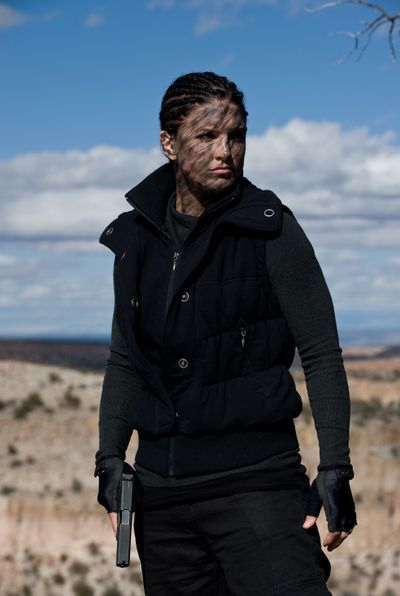Pre-scene nerves a familiar feeling
Martial artist finds parallel with fighting

MIAMI – In August 2009, before she was starring in the propulsive action picture “Haywire,” mixed martial arts fighter Gina Carano was nursing bruises. She had just been battered by the fists of Cristianev “Cyborg” Santos, the Brazilian juggernaut who bloodied the former “Face of Women’s MMA” and spoiled Carano’s undefeated record, beating her by TKO in the first round of their match.
“Driving home, I kept thinking ‘What just happened?’ ” recalls Carano, 29. “I had trained really hard for three months, I was in the best shape of my life, and that was not how I had seen that fight going. It was one of those moments in life where you’re not even hurting. You’re just numb.”
When her agent called a couple of days later to say there was a filmmaker who wanted to meet her, Carano declined, because she was too embarrassed by the loss to talk to anyone. But her agent persisted, saying the director was Steven Soderbergh, the director of “Erin Brockovich,” “Out of Sight” and “Traffic.”
“I thought ‘Oh, wow! That guy wants to meet me?’ ” Carano says. “But I still told my agent ‘Are you sure you want me to meet him? Because I’ve got a huge black eye, and I’m not looking too great right now.’ ”
Soderbergh, an Oscar-winning filmmaker fond of experimentation, had previously made “The Girlfriend Experience,” a drama about a high-class escort built around the off-screen persona of its lead actress, porn star Sasha Grey. But that movie was made for $1 million and featured no recognizable actors. “Haywire,” which cost $25 million, was a much bigger risk. As a way of auditioning Carano, he took the train from Los Angeles to San Diego and sat down with her for a four-hour lunch.
“We talked about films, fighting, our personal lives and our families,” Carano recalls. “By the end, he was like ‘Well, this is what I want to do: I want to make an action film starring you.’ He said there was no script and no studio attached yet, but he wanted to meet me first to see if I’d be interested in doing it. I couldn’t believe this was happening.”
Two days later, Soderbergh called to say the project was a go and two studios were already bidding on distribution rights. Two months after that, Carano was in Los Angeles training with former Israel Special Forces agent Aaron Cohen, author of “Brotherhood of Warriors: Behind Enemy Lines with a Commando in One of the World’s Most Elite Counterterrorism Units.” Soderbergh hired Cohen as a technical adviser to “Haywire,” in which Carano plays a black ops super-soldier named Mallory who is betrayed by her fellow agents (including Michael Fassbender, Ewan McGregor, Channing Tatum, Michael Douglas and Antonio Banderas).
Although Carano had appeared in films before – she was in “Ring Girls,” a documentary about female fighters, and had one scene in the underground fight-club drama “Blood and Bone” – none had approached the scale of “Haywire.” Filming began in Dublin: The first scene showed Carano arriving at a train station and being met by another secret agent (Fassbender) posing as her husband.
“I was completely shaking and thinking ‘Am I really going to be able to do this?’ ” Carano says of her first time on a movie set. “I had this fight or flight moment when I thought ‘If I just start running and hide, they’ll never find me.’ Then (Fassbender) walked over and said, ‘If we were actually married, I would probably give you a kiss when I picked you up at the train station.’ So not only was it my first day of acting, but I was going to have my first kissing scene. I was like a giddy schoolgirl. My whole mouth was shaking.”
Carano draws a parallel between the nerves she felt on the “Haywire” set and the nerves she felt whenever she stepped into the ring for a fight.
“They are oddly similar,” she says. “In fighting, you’re going to fight a person who is going to be trying to take your head off, and it’s going to happen in front of all these people, so everything is escalated. You’re hyper-sensitive. You feel everything around you, and then you have to hone in on the person in front of you and everything goes away and you become extremely present.
“Acting is the same thing. You are completely vulnerable; your adrenaline is pumping and everyone is watching you. You have to let everything else fall away and be extremely present with the other actor. That’s what I enjoyed the most about fighting: The conversation that goes on between two people. It’s just really raw and natural.”